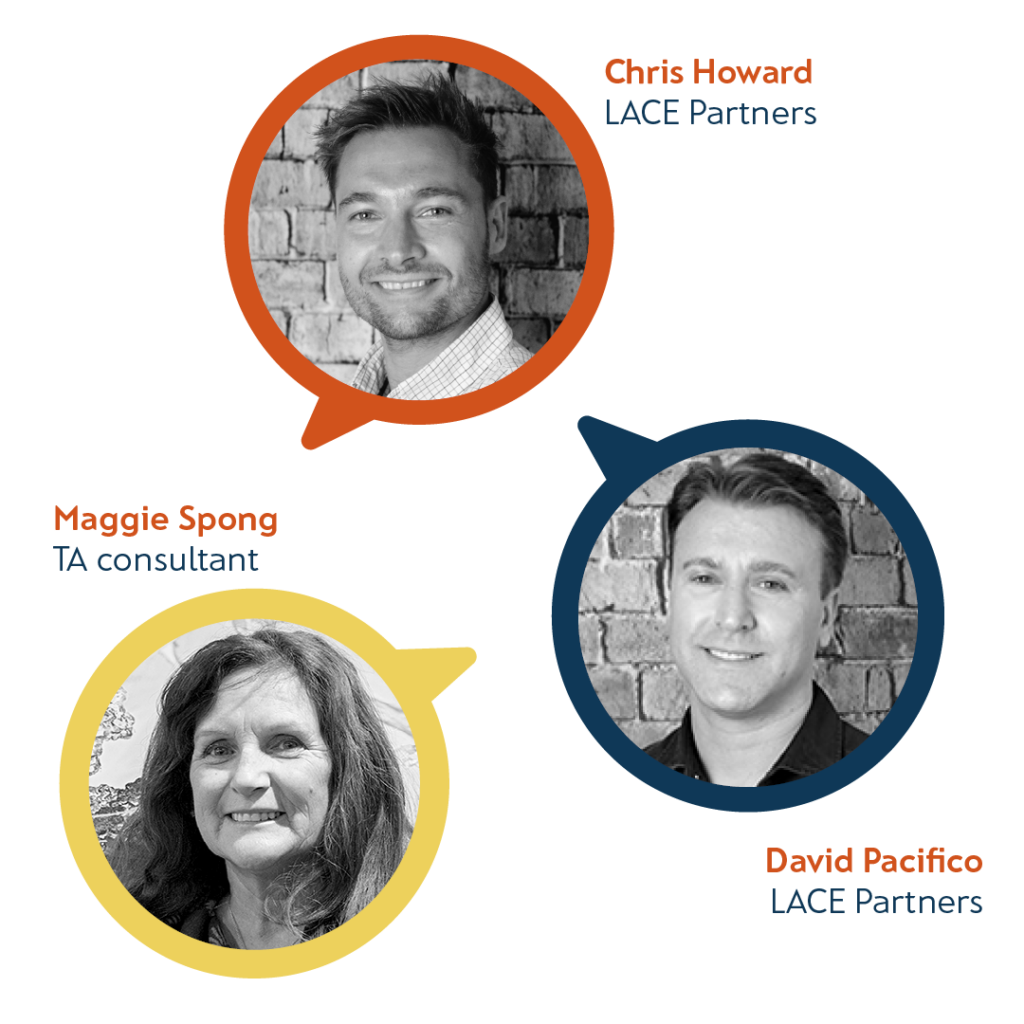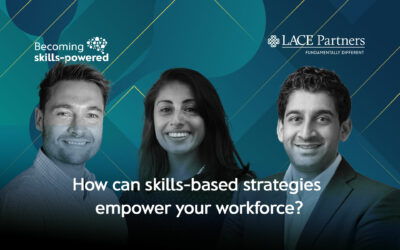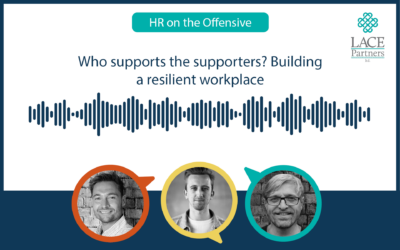 On a recent episode of our podcast HR on the Offensive, LACErs Chris Howard and David Pacifico had a chat with Maggie Spong, the former Global Head of Talent Acquisition at AstraZeneca and Roche, about boosting the talent acquisition process and delivering a first-class experience for candidates. Let’s read more about Maggie’s views on the topic and how recruiters can sharpen their skills.
On a recent episode of our podcast HR on the Offensive, LACErs Chris Howard and David Pacifico had a chat with Maggie Spong, the former Global Head of Talent Acquisition at AstraZeneca and Roche, about boosting the talent acquisition process and delivering a first-class experience for candidates. Let’s read more about Maggie’s views on the topic and how recruiters can sharpen their skills.
DP: Talking about talent acquisition, what do you think leaders should focus on?
MS: One of the challenges is about the candidate experience and how to do that well. You know, despite how much everybody tries, the candidate experience area still needs a lot more work and attention. So, throughout my career, I’ve always had a mantra for the recruiters: ‘Put yourselves in the candidate’s shoes. How would you feel if you were going through a recruitment process?’ Once they’ve got their job, people quickly forget how difficult it was and what it felt like going through that process.
Another aspect is how to optimise all the tools that are available and what are the ones that really can add value. There are so many options, but what can you use to make a difference for the whole process?
You need to know where you are, where the business is. What’s the level of capability? How much can the business take on? You can’t just put lots of tools in. People have to be able to use them.
CH: What’s your view on empathy as a skill?
MS: There are so many skills that recruiters need to have – technology, project management, marketing – but empathy is definitely one of the most important skills in talent acquisition. It’s about relationships. Always remember to put yourself in the shoes of the candidate.
DP: One of the things that you’ve done really well over the course of your career at Roche and AstraZeneca is to drive a level of consistency in that experience. Because when you’re looking to hire thousands of people every year in the cases of AZ and Roche, getting those minimum standards right is critical.
DP: What do you put in place to ensure consistency in the candidate experience?
MS: Ensuring minimum standards is a really good way of building, transforming and improving all the processes that you may have. In my past experiences, at every stage of the process we implemented a standard, for example, getting back to candidates within a day through an automatic response. Then, another standard was to review the CV and decide the next steps, whether the candidate was suitable or not, and this could happen in three days. Setting up standards throughout every stage of the process helps give the candidate a good experience. You don’t want to wait too long, because if candidates are going through a process with another company and get contacted sooner, you may lose suitable ones.

Candidates that have had a negative experience could use social media or word of mouth to tell their stories and impact a brand’s reputation. An example is a study by Virgin Media a few years ago about the economic impact of a negative or positive candidate experience.
DP: How can hiring managers change dynamics?
MS: It’s all about communication change management. The recruiter needs to drive that with their hiring managers. Define the processes because if you don’t have the basics you can’t build a proactive recruitment approach.
Also, include people in the process design. If you just do it from an ivory tower, it never works; you must have that very inclusive approach. Involve the key players, the business, get their feedback. If you include them from the beginning, they buy in so much more.

CH: Why do you think businesses are still struggling with their talent acquisition process?
MS: I think it’s because they have too many priorities, and unfortunately they don’t see recruitment as strategic, they just see it as operational, they don’t prioritise it enough or put the resource and the effort into it. Put recruitment first, and you’ll see the benefits.
DP: What’s your view on talent scouting?
MS: I think the talent scouting model is really where the future of HR of recruitment lies, and it’s because you do really build that close relationship with the candidate. Build your pipelines, keep in touch with talents very early on and through their career. To recruiters, I’d say to keep yourself up to date with all the skills you know, make sure you’re continually learning yourself, respect the candidates and you will drive a good experience, also for those candidates that you don’t hire.
CH: It’s an interesting point; building advocacy amongst those people that you don’t take on the role is critical, because if somebody is not suitable now, they may be right in the future, and the good experience that they had could make them reapply to the same company in a few years time.
MS: This is essentially what talent scouting is about. But recruiters have a fundamental role, because they build the pipelines and the relationships. Line managers have responsibilities as well, as they should be talent magnets, optimising networks that then the recruiter can access. However, the recruiter can’t expect the line managers to do all the work in the talent acquisition process, because they have to attend their own duties, that’s way talent scouting and recruitment teams are so important.

CH: What’s the influence of a business’ culture in the candidate experience?
MS: You want to be really honest about your culture and your story and just make that clear. The story you tell outside, you want it to be the story that’s inside, otherwise people won’t enjoy it being in the company and they won’t stay. And you want people to stay. You want to hire the right people at the right time, and you want them to enjoy the culture and be part of building it.
DP: What’s going be different in the future of talent acquisition?
MS: There’s going to be much more technology in the sourcing area, or keeping in touch with the candidates. But what I’m bit nervous of and I really don’t want it to happen is to lose the personal touch. There may be smaller recruitment teams because the technology will be taking on a lot of that hard admin and process work. Maybe one of their team members will be a robot. You must embrace technology, because that’s the direction that we’re taking. But empathy and the relationship building will stay. Always remember to continue to put the candidate at the core, and to put yourself in their shoes.
You can also listen to this episode in full on our podcast.
If you would like to talk to us about any issues relating to HR then fill in the form below and let us know in the comments section how we can help.






